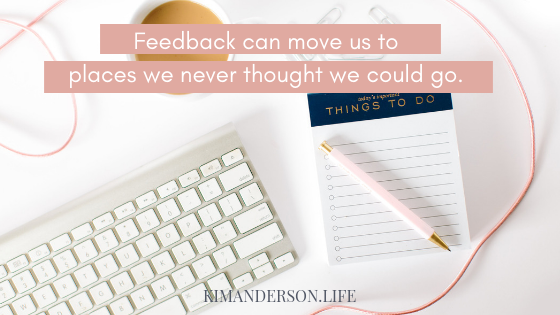The Secret Weapon of Feedback
Feedback. It can be scary. We cringe or tense up the moment we realize someone is going to share his perspective of us, our words, or our performance. We can feel exposed and vulnerable as shame washes over us and sets our nervous system on fire.
Feedback, however, can move us to places we never thought we could go. If we can courageously embrace feedback and the value it brings, it can get us unstuck.
You can move toward all you are made for by embracing these three truths when you have the opportunity to receive feedback:
Feedback helps us improve our performance.
Good, constructive feedback helps us move closer to our goals. And who wouldn’t want that? Why would we be afraid of something that will grow us, stretch us, and refine us?
Well, because of shame. Yep, shame. We all love positive feedback. Who wouldn’t? It’s the negative feedback we run from. We tell ourselves that negative feedback means we are bad. We mistakenly tie our worth to perfection. But, perfection is impossible, and it’s impossible to improve if we only hear what we are doing well. Feedback helps us home in on what we can improve. Feedback moves us forward.
Feedback helps us improve our relationships.
When we receive feedback from another, we promote engagement. We are investing in the relationship and actually increasing the emotional and relational connection. Graciously receiving feedback lets the other know we value her input, and we value her. It is likely difficult for her to share the concern in the first place, but she thinks maintaining your relationship is worth the risk. So, how wonderful is it if you can actually receive her words?
Feedback gives us clarity.
With direct feedback, we learn where to invest our energy. We identify areas of growth and gauge whether our effort is purposeful. I don’t know about you, but I don’t want to be off-course. If I am aiming at a goal, I want to hit it in the most direct and efficient way possible.
Remember, vulnerability is essential if we want to be open to feedback. Vulnerability pays off in remarkable ways when we can open up and humbly receive others’ insight and coaching. When we set aside pride and mistrust, we can become more focused, effective, and purposeful.
Here are some important questions to ask after receiving feedback:
1. What praise was shared (we often overlook the good)?
2. What actions were suggested?
3. What message am I sending to others based on my words or actions?
4. Is this how I want to be perceived?
5. Is there anything about the feedback that I didn’t expect?
6. Did anything align with ideas I already have about my areas of growth?
7. How can I grow from this feedback?
These questions help remove emotion from feedback and give us a clear map for growth.
Unfortunately, not all feedback is safe. Unlike criticism or cruelty, healthy feedback comes from someone who wants to see you grow and is for you. It should be collaborative, purposeful, and for your good. When I talk of receiving feedback, I am referring to constructive information provided in love and support, not spiteful, sarcastic words that someone is using to cut you down.
I encourage you to welcome feedback and watch yourself grow!
You’re amazing! Start living like it!
Kim Anderson is a Licensed Professional Counselor (LPC-MHSP) and a Certified Life Professional Coach (CPLC) who loves helping others live their lives with passion and purpose. She lives with her husband and two teenagers outside of Nashville, in Franklin, Tennessee, where she loves seasons, rolling hills, and the warmth of the South. Follow Kim at www.kimanderson.life, on Instagram @kim_anderson_life, and on Facebook@ KimAndersonLifeCoachingto learn more about what she offers.


